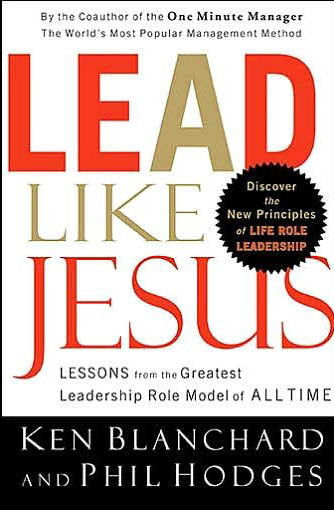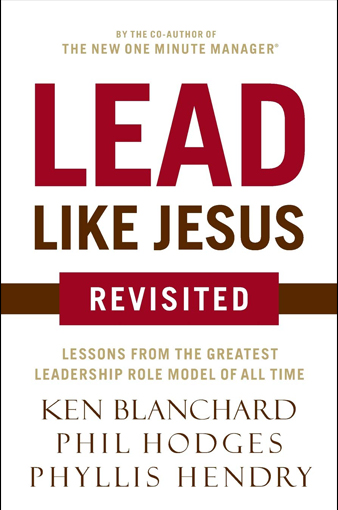Lead Like Jesus
While I was aware of the importance of leadership early in my career, it wasn’t until my own leadership journey began that I started to pay more attention to what a good leader looked like. As so many of us have done, I began searching for role models both inside my company and outside in the realms of government, universities, churches, and beyond. The more I studied, the more I became intrigued while learning what to do to lead effectively and, just as importantly, what not to do. I also learned, somewhat painfully, that there are no perfect leaders. It took much longer than it should have to realize that the one role model who personified perfection was none other than the humble carpenter from Nazareth, Jesus Christ. Finally, my focus changed.
Enter Ken Blanchard and Phil Hodges, authors of Lead Like Jesus. It was not my first exposure to Blanchard, a longtime influencer in the field of effective management. He is known for an array of business leadership books which he co-authored with other experts on topics ranging from building trust in the workplace to achieving professional success and personal fulfillment. A big fan of Blanchard’s bestsellers like One Minute Manager, Raving Fans, and Gung Ho, I obtained a copy of Lead Like Jesus. In his foreward he wrote, “I soon became aware that everything I had ever taught or written about effective leadership over the past 25 years Jesus did to perfection beyond my ability to portray or describe.” Wow, he had grabbed my attention for sure!
As I became fully immersed in the book, I couldn’t help but think back to 15 years before when I was first introduced to the concept of “servant leadership,” originated and popularized by Robert Greenleaf. Greenleaf wrote three essays in the early 1970’s showing that individual efforts, inspired by vision and a servant ethic, could make a substantial difference in society. His philosophy turned the traditional notion of leadership upside down, characterizing leaders as servants. I embraced this model because, quite frankly, it felt right to me. Looking back however, I now know that it was missing something—something big. It was missing Jesus as the ultimate role model, which brings me back to Lead Like Jesus. The more I contemplated the content, the more I became convinced that Blanchard and Hodges had it right. Leadership is a process of influence, they said. Anytime you seek to influence the thinking, behavior, or development of individuals in their personal and professional lives, you take on the role of a leader. If you think this book is limited to the business sector, think again. Since leadership permeates virtually every segment of life, few can escape its importance.
We all lead, in some way. In that context, think about the following as the authors quote Matthew 20:25-28 (emphasis added):
Jesus called them together and said, “You know that the rulers of the Gentiles lord it over them, and their high officials exercise authority over them. Not so with you. Instead, whoever wants to become great among you must be your servant, and whoever wants to be first must be your slave—just as the Son of Man did not come to be served, but to serve, and to give his life as a ransom for many.”
There is no room for Plan B, they say. For followers of Jesus, servant leadership is not an option, it is a mandate. Blanchard and Hodges explore what they call the four domains of leadership: heart, head, hands, and habits. It is perhaps this quote that best defines that which a Christian leader must overcome: “The most persistent barrier to leading like Jesus is a heart motivated by self-interest.” Looking to Christ and becoming a servant as He did, we are better able to develop the heart of a true leader—incorporating the concepts of compassion, forgiveness, grace, and kindness into our leadership style. I encourage you to explore Lead Like Jesus in detail as I did. Those whom you are fortunate to lead will be the beneficiaries of your efforts.
by Jack North
SERVANT LEADERSHIP
“One of the greatest challenges in seeking to lead like Jesus is the intimacy with Him that this approach requires. The biggest barrier to intimacy is a fear of vulnerability—the fear of having to admit you don’t know all the answers, that you may need help, and that your abilities as a leader may be questioned…
“God’s love will change you and, by extension, change your leadership. You will see leadership differently: it becomes less about power and control and more about the stewardship of the people you touch and of the work God has given you to do. You will see people differently, too: rather than seeing them as a means to accomplish the results you want, you realize that God has the same love for them that He has for you. Work becomes an act of worship and your workplace an outpost of God’s kingdom.”– Ken Blanchard & Phil Hodges
Excerpt from Lead Like Jesus: Lessons from the Greatest Leadership Role Model of All Time, Nashville, TN: Thomas Nelson, 2008
BOOK RECOMMENDATION:
Lead Like Jesus Revisited
“There is no need to search further. We have the perfect leadership role model in Jesus. We simply need to follow Him and allow Him to work in us and through us. “Even though we have been declaring for many years that Jesus is the greatest leadership role model of all time, we have not realized the full extent of the leadership gifts He offers us. Jesus is not only the greatest servant leader but also the greatest visionary, the greatest team builder, the greatest team motivator, and the greatest change agent of all time. In fact, we cannot think of any attribute of leadership that Jesus did not model for everyone as He trained His disciples. Now, more than two thousand years later, Jesus still has more followers than any leader the world has ever had.”
Excerpt from the introduction of Lead Like Jesus Revisited: Lessons from the Greatest Leadership Role Model of All Time by Ken Blanchard, Phil Hodges & Phyllis Hendry, Nashville, TN: Thomas Nelson, 2016






